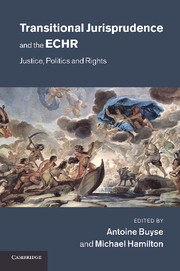Book contents
- Frontmatter
- Contents
- Foreword
- Acknowledgements
- 1 Introduction
- 2 Transitional emergency jurisprudence
- 3 Rights and victims, martyrs and memories
- 4 Confronting the consequences of authoritarianism and conflict
- 5 Freedom of religion and democratic transition
- 6 The truth, the past and the present
- 7 Transition, political loyalties and the order of the state
- 8 Transition, equality and non-discrimination
- 9 Closing the door on restitution
- 10 The Inter-American human rights system and transitional processes
- 11 The ???transitional??? jurisprudence of the African Commission on Human and Peoples??? Rights
- 12 Conclusions
- Index
- References
2 - Transitional emergency jurisprudence
derogation and transition
Published online by Cambridge University Press: 07 September 2011
- Frontmatter
- Contents
- Foreword
- Acknowledgements
- 1 Introduction
- 2 Transitional emergency jurisprudence
- 3 Rights and victims, martyrs and memories
- 4 Confronting the consequences of authoritarianism and conflict
- 5 Freedom of religion and democratic transition
- 6 The truth, the past and the present
- 7 Transition, political loyalties and the order of the state
- 8 Transition, equality and non-discrimination
- 9 Closing the door on restitution
- 10 The Inter-American human rights system and transitional processes
- 11 The ???transitional??? jurisprudence of the African Commission on Human and Peoples??? Rights
- 12 Conclusions
- Index
- References
Summary
International law recognises and accommodates the fact that in times of political, economic or social crisis the state may be required to limit the extent of protection resulting from consentingly entered into treaty obligations protecting individual rights. The derogation provisions of the international human rights instruments including Article 15 of the European Convention contain the politically and legally mandated processes whereby states can suspend their international obligations protecting individual rights in time of emergency or crisis. Given that the Council of Europe (and the Convention as its primary legal instrument) was born out of a massive transition from war to peace on the European continent, transition can be viewed a motif for the early history of the Convention. In this sense, the Convention itself constitutes a response to the devastating human rights violations of the Second World War, and can be understood as a transitional legal instrument. With that background in mind, this chapter explores the extent to which an extensive jurisprudence of emergency powers in the European system contains recognition of or interfaces with the thematic and structural aspects of transitional justice discourse.
- Type
- Chapter
- Information
- Transitional Jurisprudence and the ECHRJustice, Politics and Rights, pp. 24 - 51Publisher: Cambridge University PressPrint publication year: 2011
References
- 3
- Cited by

